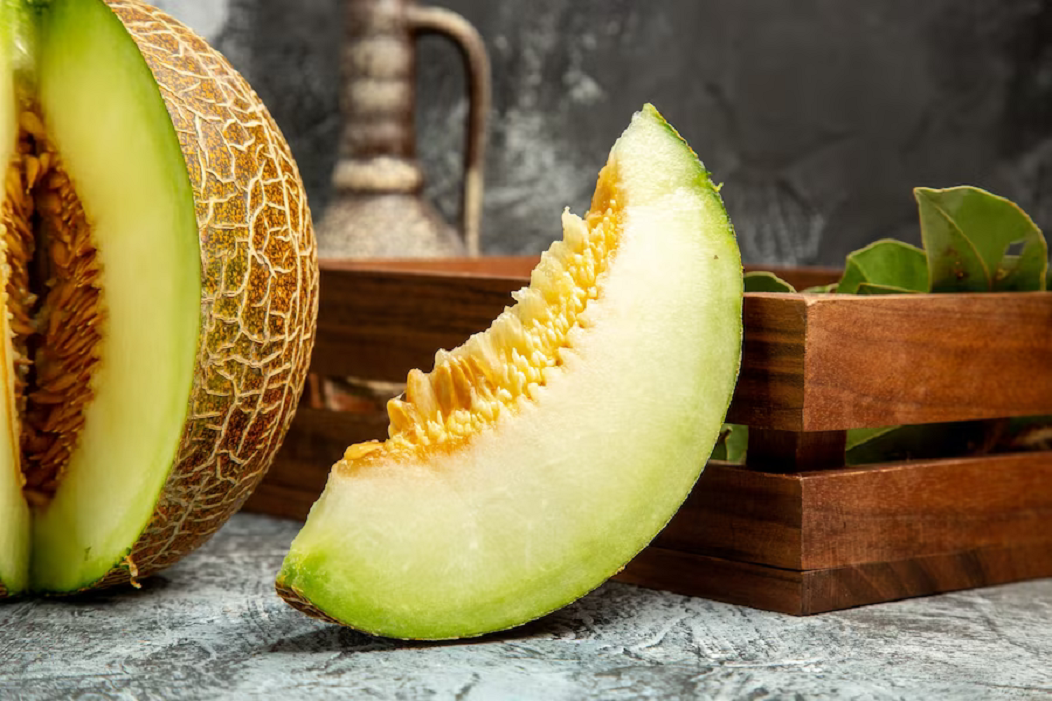Honeydew melon is a hydrating and low-calorie fruit that belongs to the melon species Cucumis Melo. It is a large fruit characterized by having a sweet taste and green flesh. It is available all around the globe and is eaten in various forms.
Apart from its amazing flavor, honeydew melon is a nutritious fruit and imparts multiple health benefits. It may help improve heart health, prevent dehydration, control blood pressure levels, promote eye health, and is also good for the skin.
If you’re intrigued to know everything about this refreshing and delicious fruit, then keep reading. This article provides insights into its nutritional value, health benefits, side effects, and some delicious ways to eat it.
Nutrition Facts of Honeydew Melon
Honeydew contains a treasure trove of nutrients that are highly beneficial in optimizing your overall health and well-being. A 1-cup serving of honeydew melon provides:
- Calories: 64
- Carbs: 16 grams
- Fiber: 1.4 grams
- Protein: 1 gram
- Fat: 0 grams
- Vitamin C: 53% of the reference daily intake (RDI)
- Vitamin B6: 8% of the RDI
- Folate: 8% of the RDI
- Vitamin K: 6% of the RDI
- Potassium: 12% of the RDI
- Magnesium: 4% of the RDI
In addition, honeydew and its seeds are also rich in bioactive compounds, including quercetin, beta-carotene, caffeic acid, and phytoene.
Varieties of Honeydew Melon
There are multiple different types of tasty and nutritious varieties of honeydew melons available in the market that you can freely choose and enjoy.
-
Green Flesh Melon
Green flesh melon commonly originates from Africa and India. But now, it is widely grown all around the globe because of its delectable taste and surprising nutritional value.
It’s one of the most popular types of honeydew melon and has a round or oval shape. The flesh of the melon is slightly crispy, sweet, and light green in color.
-
Yellow Cantaloupe
Yellow cantaloupe is another famous type of honeydew melon that is quite easy to grow and is available in almost every season.
It has green flesh, but the outer skin is light yellow and has bright white veins forming a netting. Green-fleshed cantaloupe is highly nutritious and may help improve your heart health.
-
Ananas Melon
Ananas melon is native to the Middle East. It has the typical cantaloupe flavor and a mild aroma with strong sweetness. This type of honeydew melon has a thicker outer skin, an oval shape, and many interwoven lines. Its flesh varies in color and can either be pale orange or creamy white.
Uses of Honeydew Melon
Honeydew melon has a scrumptious flavor, and you can incorporate it into several recipes.
- Refreshing Snack: You can dice it in small pieces and enjoy it as a refreshing snack on its own.
- Salads: Slice it into bite-sized pieces and mix it into your favorite salad.
- Desserts: You can enjoy honeydew melon in ice creams in pureed form.
- Appetizers: Add slices of melon to tangy salsa and eat it as a tasty appetizer.
- Smoothies: Combine honeydew melon with yogurt, blend it, and get a refreshing smoothie.
Health Benefits of Honeydew Melon
Honeydew melon is a nutritious fruit that is enriched with a plethora of key nutrients, including vitamin C, vitamin A, folate, and water. All of these exert numerous benefits on our overall health:
-
Supports Immune System
Honeydew is high in vitamin C content that helps our body combat viral infections, hence supporting the immune system. It also benefits our skin, blood vessels, and bones by boosting collagen production.
-
Stimulates Digestive Health
The fiber content in honeydew melon stimulates healthy digestion by supporting the growth of beneficial gut bacteria.
-
Have Hydration Properties
Honeydew melon is high in water content and prevents dehydration. In this way, it helps support optimal health and bodily functions.
-
Contains Nutrients Vital to Bone Health
It comprises several essential nutrients that are crucial to our bone health. They typically include magnesium, folate, and vitamin K.
Possible Side Effects of Honey Dew Melon
Honeydew melon is completely safe when consumed in moderate quantities. However, as we know, excess of everything is bad; therefore, if it’s eaten in relatively large amounts, it may lead to several side effects, such as indigestion, diarrhea, and a spike in blood sugar surges. Apart from that, some people can also be allergic to this fruit, but it’s quite rare to happen.
Facts About Honeydew Melon
Conclusion
Honeydew melon is a tasty and nutritious fruit that can be found all around the world. It has a light-green color, while its skin is generally white or yellow. It’s enriched with vitamins, and adding it to your diet can deliver several health benefits.
In addition to that, It is a highly versatile fruit, and people relish it as part of various dishes, like desserts, salads, soups, smoothies, and a lot more. For the best experience, pick a fully ripened and in-season melon.
FAQs:
Is Honeydew Hot or Cold?
Honeydew is cold in nature and is an excellent source of vitamins A and C. It can refresh your body and is considered a perfect beat-the-heat fruit.
Is It OK To Eat Honeydew Melon At Night?
It is usually not preferable to eat honeydew melons during the night right before going to sleep. As it gets difficult to burn the sugar compounds at this time and may cause indigestion. The best time to enjoy this fruit is in the morning.
Is Honeydew Melon Good For Weight Loss?
Honeydew melon is an amazing source of fiber, high in water content, and has relatively low calories, making it an incredible choice for a weight-loss diet.



